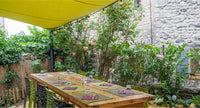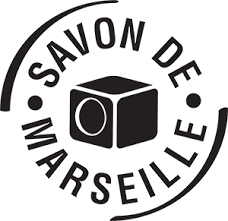HAPPY TO HELP
Telephone or WhatsApp +44 (0) 1423 803080 Chat or Email, whatever is best for you.
T. 01423 803080
All orders ship from North Yorkshire
48hr Tracked delivery £3.95
Free Priority Delivery on Orders over £50
763 PRODUCTS IN STOCK
Telephone or WhatsApp +44 (0) 1423 803080 Chat or Email, whatever is best for you.







Inspired by a recent customer query on how to tell if you are buying authentic Savon de Marseille. The customer emailed us asking for some proof of authenticity so he could be reassured with his purchases. He was prompted to make these enquiries after buying "Savon de Marseille" from Amazon which unfortunately turned out to be fake.
The term "Savon de Marseille" does not have a protected designation (like Champagne does) and it can be difficult for customers to know what is the true product. In addition, genuine savonneries in Provence (like the ones we work with here at Frenchsoaps) use the stamp "Savon de Marseille" on all sorts of soap that they make as it is used broadly as a definition of soap made in Provence. So hopefully this blog will throw some light on what we mean by traditional Savon de Marseille and what to look for to ensure you are buying an authentic product.
Traditional Savon de Marseille is made to a 100% vegetable oil recipe with no added colourings, fragrances, preservatives or any artificial ingredient. The soap is made in a traditional way, baked in a couldron, and has been made in this way for hundreds of years and is only made in the Marseille region of Provence in France. It is as pure as soap can be.
The Traditional Savon de Marseille that we sell is made by two of the original 4 famous Savonneries in Marseille, Fer a Cheval and Savonnerie du Midi under their brand La Corvette. The authenticity is guaranteed by the mark "Savon de Marseille" created by the Union of Soap Professionals of Marseille an association created in 2011 to defend, promote and publicise authentic Savon de Marseille.
The "Savon de Marseille" label is issued by the Soap Professionals Union of Marseille to companies located in a specific geographical area and respecting a manufacturing process defined in a charter. Companies are audited annually and must show:
1) Original recipe composition:
2) 5-Step production process:
3) Geographical origin:
Our range of traditional Savon de Marseille includes 100g, 300g and 600g cubes a 2kg Bar of Natural and Olive soaps, as well as tranches (slices) with twine, rotating soaps for a rope and 65g, 100g and 250g bars.
We also have stain-removing/laundry bars, including our 300g Marseille soap stain-removing bar, dishwashing soaps and soap flakes, including the La Corvette Marseille Soap Flakes for Laundry.
See our full range traditional Savon de Marseille soaps. Also, you may want to take a look at our best-selling Savon de Marseille cube.
Fer a Cheval’s products are exclusively made with 100% Olive Oil (Pure Olive) or 100% Sustainably Palm Oil (Natural).
La Corvette use 90% Olive Oil and 10% Coconut Oil.
There are other genuine French soaps made in and around Marseille and other parts of Provence that are also stamped with the words "Savon de Marseille". Fragrant ranges of perfumed soaps have added colours, plant and flower essences, perfume and other added ingredients such as sweet almond oil, argan oil and shea butter.
These soaps are triple milled ensuring they are long lasting and nourishing. Making soap with local ingredients and perfumes has developed over the decades in Provence and stems from the old Marseille savonneries and traditions. These French soaps are showcased on the soap stalls in markets all around France.
These soaps made in Provence are stamped with the words "Savon de Marseille" as they literally are soaps made in the Marseille region. You may also see 'Fabrique en Provence'. We tend to call these soaps "Marseille" soaps or "Savon de Provence" to try and make it less confusing!!
See our full range of fragranced French Marseille soaps.
In summary, check the ingredients and the name of the Savonnerie.
POINTS TO NOTE
The historical Savonneries have the expertise and know how that allows them to make for other brands. The product will be stamped “fabrique en…” meaning “it is made by…” However the formulations vary. For example you will find legitimate Savon de Marseille in the UK from Fer a Cheval that is made with 100% Pure Olive Oil, whilst La Maison du Savon de Marseille has a 70/30 split of 70% Olive Oil and 30% Coconut Oil, where as Savon de Marseille from Foufour is also 70/30 but with 70% Olive Oil, 20% Coconut Oil and 10% Palm Oil. 
FEATURES OF CONCERN
If you see any of the following in descriptions then the product you are considering is unlikely to be genuine traditional Savon de Marseille.
If in doubt, or if this is simply confusing, then do get in contact with us.
Telephone or Whats App: 01423 803080
Email: bonjour@frenchsoaps.co.uk
Social: @FrenchsoapsUK
Address: Unit 14 Ousegill Business Park, Carr Side Road, Great Ouseburn, North Yorkshire, YO26 9AE
Sign up for our newsletter and get all the latest news, offers and more delivered straight to your inbox. You can unsubscribe at any time. By 'submitting' you are agreeing to our T&C's and Privacy Policy.

Gifting couldn't be easier
Add a gift message to be emailed to when their parcel arrives, or at a time of your choice.
